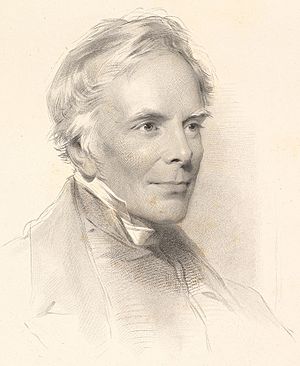National Apostasy facts for kids
"National Apostasy" was the name of a famous talk, or sermon, given by a man named John Keble. He gave this talk at St Mary's, Oxford, on July 14, 1833. Many people believe this sermon was the start of a big religious movement. This movement was called the Oxford Movement. It involved high church Anglicans, who were also known as the Tractarians.
Contents
Why the Sermon Was Preached
The years before 1833 saw big changes in how the Church of England and the government worked together. For a long time, people who were not part of the Church of England faced unfair rules.
Changes to Religious Laws
In 1828, old laws that treated Protestant Dissenters unfairly were removed. Then, in 1829, a law called Catholic Emancipation was passed. This law gave Catholics more rights.
New Government and Church Worries
In 1830, the Tory government, which had been in power for a long time, was replaced. A new government, led by the Whigs, took over. The Whigs wanted to make many changes, or "reforms."
Many leaders in the Church of England worried about these changes. They feared the Whigs would change the Church's rules and power. In 1833, the Whigs passed the Church Temporalities Act. This law changed the Church of Ireland and reduced the number of its bishops. This made many Anglicans even more afraid that the government would act against the Church's wishes.
What John Keble Talked About
John Keble's sermon was based on a Bible verse from 1 Samuel 12:23. It said: "As for me, God forbid that I should sin against the Lord in ceasing to pray for you: but I will teach you the good and the right way."
Turning Away from God
Keble started by talking about sin and how God might punish it. He said that a Christian country might turn away from its faith. This could happen if it saw other countries, which were less religious, doing well. He believed this turning away came from a "decay or want of faith."
People might want to follow their own desires, he said. They would easily find reasons to do so. Keble saw people not caring about religion as a sign of this problem. He called these signs "omens and tokens of an Apostate Mind in a nation." An "apostate mind" means a mind that has turned away from its beliefs.
Ignoring Christian Values
Keble also pointed out that people were starting to ignore Christian ideas in public life. They were not trying to follow Christian rules in how they acted as a country. He also noticed that people who had made promises, like oaths, were not taking them seriously.
He said this showed a "profane dislike of God's awful Presence." It meant people were generally trying to leave God out of their thoughts. Keble also said that disrespecting church leaders, or the "Successors of the Apostles," was a sign of being against God. He warned political leaders not to give up their religious beliefs for easy political solutions. He used the story of Saul from the Bible as a warning.
Keble's Advice for the Future
Keble ended his sermon by giving advice. If England turned away from God, he said, Christians should act like the prophet Samuel. They should pray for their country and calmly speak out. He told them not to rebel against the government.
He said, "Submission and order are still duties." This meant they should still obey the rules. Instead, Keble asked his listeners to show their Christian beliefs through "piety, purity, charity, justice." He told them to be brave against "anti-Christian powers." He asked them to work hard for the church that followed the apostles' teachings.
How Important Was the Sermon?
Historians have different ideas about how important Keble's sermon truly was.
Different Views on Its Impact
John Henry Newman, another leader of the Oxford Movement, believed the sermon was very important. He wrote that he always saw July 14, 1833, as the start of the religious movement. Many historians, like R. W. Church, agree with Newman.
However, other historians, such as F. L. Cross and Owen Chadwick, do not think the sermon was as important. Chadwick noted that a copy of the sermon given to E. B. Pusey, another key Tractarian leader, was still unopened when Pusey died almost 50 years later. This suggests Pusey might not have seen it as a major event. Kirstie Blair, who studies sermons, says the sermon is more famous because Newman talked about it than for what it actually said.
 | Mary Eliza Mahoney |
 | Susie King Taylor |
 | Ida Gray |
 | Eliza Ann Grier |


